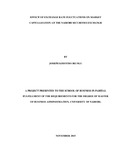| dc.description.abstract | Market capitalization is an important measure for investors in the determination of the
returns on their investment. Day-to-day stock price fluctuations provide freely available
information on the health of a publicly traded company. Exchange rate fluctuations affect
operating cash flows and firm value through translation, transaction, and economic
effects of exchange rate risk exposure. The Kenya shilling has registered mixed
performances against the USD. These fluctuations tend to increase market capitalization
risk. In the Monetary Policy for Fiscal year 2011/2012, CBK attributed the appreciation
of the Kenya shilling to the tight monetary policy stance adopted by the Monetary Policy
Committee. In addition, the disbursements from the IMF through the Enhanced Credit
Facility programme towards the end of 2011 and the disbursement of USD 600 millionsyndicated
loan to the government provided a further cushion to the Kenya shilling.
Exchange rate fluctuations affect policy makers as well as investors hence the need to
study fluctuations, which can aid in financial decision-making. This study sought to
examine the the effect of fluctuations in exchange rate on market capitalization at the
Nairobi Securities Exchange. The study was a descriptive case study. The study used
secondary data collected from the Nairobi Securities Exchange. The study used monthly
average market capitalization for the period 2012 to 2014. The market capitalization was
obtained by computing the monthly market value of outstanding shares for all the 61
firms, listed at the Nairobi Securities exchange, for the period 2012 to 2014. The study
conducted a regression analysis to establish the extent of relationship between
fluctuations in exchange rate and market capitalization. The study carried out a T-test at
95% confidence level to establish the significance of the independent variable in
explaining the changes in the dependent variable. From the findings, it was clear that
there was positive correlation between the variables total market capitalization and
monthly exchange rate fluctuations (0.774). It was established that all the independent
variables had a significant contribution to the variance of the dependent variable at a
significance level of 0.05. The relative importance of each of the independent variables
was however different. Taking all factors (monthly exchange rate fluctuations, monthly
average rate of inflation, monthly average interest rate) constant at zero, market
capitalization will be 2921.680. The data findings also showed that a unit increase in
monthly exchange rate fluctuations would lead to an 18.359 increase in market
capitalization; a unit increase in monthly average rate of inflation will lead to a 55.809
decrease in market capitalization while a unit increase in monthly average interest rates
will lead to a 10.241 decrease in market capitalization. In this study, a conclusion was
drawn that the fluctuations in the exchange rate is a major determinant of the market
capitalization at the Nairobi Securities Exchange. The study therefore recommends that
the management of the firms should implement policies on growth of the market value of
the firm during the periods of high exchange rate to enjoy the benefits that come with
such seasons. | en_US |

